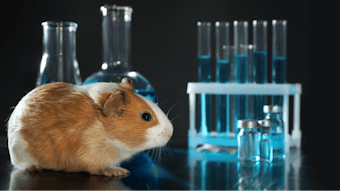Researchers Itai Chipinda and colleagues at the National Institute for Occupational Safety and Health and Portland State University have developed an animal-alternative test method to assess whether chemicals in consumer products such as soaps and shampoos may cause skin allergies. Their work, titled "Rapid and Simple Kinetics Screening Assay for Electrophilic Dermal Sensitizers Using Nitrobenzenethiol,” appears in the American Chemical Society's Chemical Research in Toxicology journal.
According to the report, the need for animal-alternative test methods to assess skin sensitization has inspired research for the use of in vitro, in silico and in chemico methods. While glutathione and other peptides that mimic skin proteins and bond to allergy-causing ingredients have been used to measure the reactivity of allergens to nucleophiles, these methods are reportedly inadequate to assess the early stages of skin sensitization observed with chemical sensitizers. Therefore, the researchers evaluated a kinetic spectrophotometric assay involving the reactivity of electrophilic sensitizers to nitrobenzenethiol.
Findings suggest that this simple, rapid and inexpensive absorbance-based method has good potential for use as a preliminary screening tool for skin allergens. When 20 different chemicals known to cause skin irritation were used, the test produced positive results; in addition, it produced negative results with three substances that typically do not cause sensitization.
This finding will likely assist product developers in assessing the safety of raw materials and their combinations for use in personal care applications. In addition, its non-animal basis allows for the testing of products for the EU, where animal testing for cosmetic products and raw materials is banned under REACH. For more information, visit the ACS Web site.




![A 2019 petition to the House of Commons stated, 'We, the undersigned residents of Canada, draw the attention of the House of Commons ... [that] animal testing is unnecessary to prove the safety of cosmetic products.'](https://img.cosmeticsandtoiletries.com/files/base/allured/all/image/2023/01/animal_testing_ban_canada_dreamstime_m_215632720.63d313232306d.png?auto=format%2Ccompress&fit=crop&h=191&q=70&rect=0%2C73%2C1800%2C1013&w=340)





